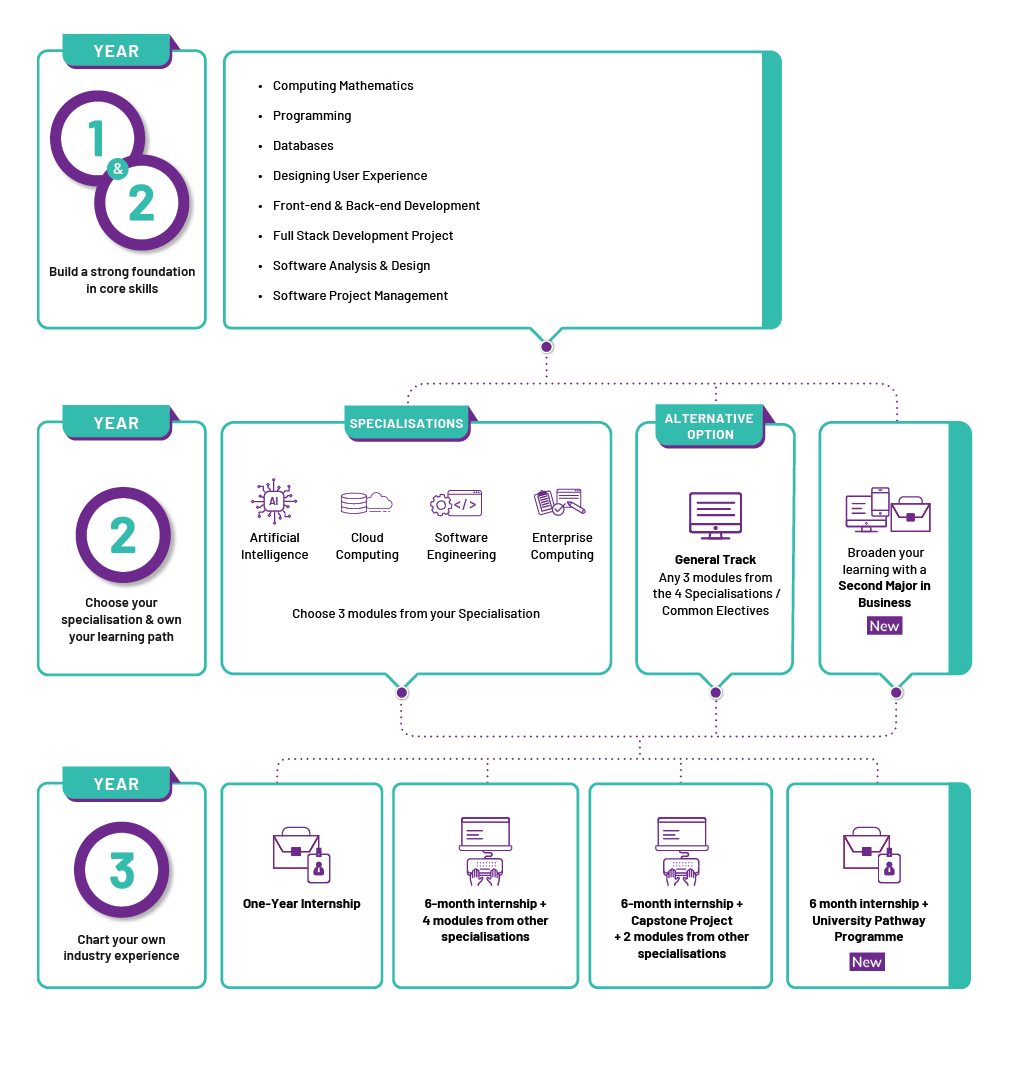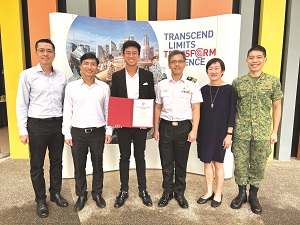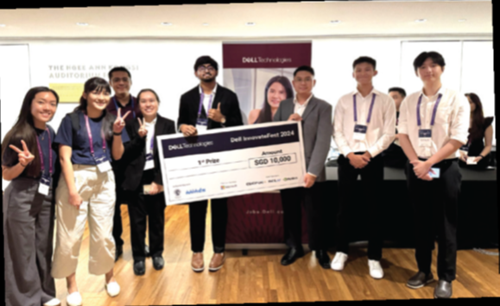Why IT?
- Build a strong foundation in full stack development and software engineering for wide-ranging careers
- Four exciting specialisations: Artificial Intelligence, Cloud Computing, Software Engineering and Enterprise Computing
- Deepen skill sets with the one-year OCBC-NP Technology Young Talent Programme
- Earn professional industry certifications from renowned organisations such as IBM, AWS and SalesForce
- Be among the first to earn a Second Major in Business and unlock new opportunities for your career and further studies NEW
About IT
Dive into the world of technology with our Diploma in Information Technology (IT). This comprehensive course will equip you with the essential skills and knowledge needed for today’s tech-driven industries.
With a strong foundation in programming, networking, databases and operating systems, you will be prepared for further studies or careers in fields such as artificial intelligence, blockchain, cloud computing, and data analytics.
Develop skills to become a full-stack developer and be well-versed in software engineering, as well as front- and back-end application development. Learn to code and apply user engagement strategies to integrate front-end interfaces with back-end components to create seamless user experiences.
Design your learning by choosing modules that best match your interests and strengths. Alongside core modules such as design principles, cybersecurity fundamentals, and programming, our flexible curriculum structure allows you to specialise in one of these four areas:
- Artificial Intelligence
- Cloud Computing
- Software Engineering
- Enterprise Computing
Alternatively, opt for the General Track and select seven electives to broaden your skills. With our extensive range of electives, you can explore technologies like machine learning, cloud databases, blockchain, game programming, robotic process automation, and digital forensics.
Be among the first poly students to take a Second Major in Business. Gain an edge with this dual qualification, which will unlock new opportunities for your career and further studies.
Fast-track your university journey with our pathways
to SMU and SUTD! These programmes let you take
university modules during your diploma studies. For
the SMU Pathway, you’ll gain advanced placement
in their Information Systems and Computing Science
programmes. Meanwhile, the SUTD Pathway allows
you to explore humanities and science modules that
count towards your degree at SUTD.
Build your digital portfolio with a capstone project to showcase your skills to potential employers.
Advance your career with additional professional certifications, such as Certified Scrum Master, AWS Certified Cloud Practitioner, Salesforce ADX 201 Certification, UiPath Certified RPA Associate, and Tableau Desktop Specialist.
Many elective modules are co-delivered with our industry partners such as Dell, Google, IBM, Microsoft, Salesforce and SAP, ensuring you are well-prepared for the industry.
Gain an edge through curated opportunities, including our exclusive one-year Technology Young Talent Programme at OCBC and valuable networking opportunities with industry professionals.
Overview of Your IT Journey

Highlights
Further Studies
You can receive advanced standing when you apply for related degree programmes at universities both locally and abroad. These include:
Singapore
- Nanyang Technological University
- National University of Singapore
- Singapore Institute of Technology
- Singapore Management University
- Singapore University of Social Sciences
- Singapore University of Technology and Design
Australia
- Australian National University
- University of Adelaide
- University of Melbourne
- University of New South Wales
- University of Queensland
- University of Western Australia
United Kingdom
- University of Essex
- University of Kent
- University of Manchester
- University of Newcastle
Careers
With our course skills mapped to the ICT Skills Framework, you can look forward to pursuing a career in these job roles:
- Applications Developer
- Back-End Developer
- Channel Sales Executive
- Cloud Engineer
- Customer Experience Manager
- Database Administrator
- Data Analyst
- Data Engineer
- Front-End Developer
- Full Stack Developer
- Infrastructure Executive
- Platform Engineer
- Pre-/Post-Sales Consultant
- Systems Analyst
- Technical Support Executive
- UI/UX Designer
Entry Requirements
AGGREGATE TYPE ELR2B2-C
To be eligible for consideration, candidates must have the following GCE ‘O’ Level examination (or equivalent) results.
| Subject | 'O' Level Grade |
|---|---|
| English Language | 1-7 |
| Additional Mathematics/Mathematics | 1-6 |
| Any one of the 2nd group of Relevant Subjects for the ELR2B2-C Aggregate Type | 1-6 |
Applicants must also fulfil the aggregate computation requirements for the ELR2B2-C Aggregate Type ( English Language, 2 relevant subjects and 2 other best subjects) listed at www.np.edu.sg/docs/ELR2B2.pdf.
For students with other qualifications, please refer to the NP website for the entry requirements and admissions exercise period.
Candidates with severe vision deficiency may encounter difficulties meeting the course requirements and expectations.
What You Will Learn
Programming I (5 Credit Units)
This module introduces the fundamentals of programming and how to develop programs using appropriate problem-solving techniques in a modular style. In this practice-oriented module, students are taught how to apply problem-solving skills using a top-down structured programming methodology and given ample practice in translating solutions into computer programs, then test and debug the programs. Topics include data types, variables, expressions, statements, selection structures, loops, simple computation and algorithms, functions and the use of libraries. Students will also practise the use of pseudocode, best practices of programming, debugging techniques with the help of tools, development of test cases, and suitable program documentation. In addition, they will study various areas where application software plays a prominent part in helping organisations solve problems. Students will be given ample opportunity for independent and self-directed learning.
Cyber Security Fundamentals (2 Credit Units)
This module provides an overview of the various domains of cyber security. It helps develop an understanding of the importance of cyber security in today’s digital world. It aims to provide an appreciation of cyber security from an end-to-end perspective. It covers fundamental security concepts, tools and techniques in domains such as data, end-user, software, system, network, physical, organization, and digital forensics. It also helps develop knowledge and skills in identifying common cyber threats and vulnerabilities, and to apply techniques to tackle these issues.
Data Science Fundamentals (2 Credit Units)
This module provides an overview of Data Science, its importance in the world of data and how it affects the competitiveness of organizations. Learners will learn about the different areas within Data Science and the core pillars essential to practise in the area. Students will also be introduced to Design Thinking. Indicative topics include Introduction to Data Science, Big Data and Analytical Design Thinking.
Design Principles (2 Credit Units)
This module introduces students to basic elements and principles of design. Students will practice visual communication and self-branding through aesthetic use of line, shape, form, color, texture, typography, scale, contrast, rhythm and balance. Students will be trained in the usage of digital design tools and application of modern industrial practices to communicate the concepts, designs and solutions.
Computing Mathematics (4 Credit Units)
This module introduces the basic concepts of relations and functions, matrices and methods of statistics and their applications relevant to IT professionals.
The main emphasis in this module is to develop students’ ability in solving quantitative problems in computing mathematics, probability and statistics. Topics covered include fundamentals of statistics and probability, discrete and continuous probability distributions.
Fundamentals for IT Professionals I (2 Credit Units)
This module provides a broad introduction to the field of ICT by exploring the roles, professional practice, ethical expectations and career development paths of IT professionals. Through a guided inculcation of interpersonal and teamwork skills with strong team bonding spirit, the module aims to deepen students’ commitment to the sector that the course prepares them for. In addition, students will be required to begin charting their career path in the ICT industry by considering crucial aspects such as personal preferences and aptitude, job roles and responsibilities, skills needed and further education.
English Language Express* (Credit Units - NA)
English Language Express aims to give you a better grounding in the English Language and to strengthen the written and oral communications skills that you will need in your academic and professional careers. You will be engaged in writing, reading, listening and speaking activities that will develop your ability to speak and write grammatically, coherently and clearly. You will also hone your reading and listening comprehension skills.
Health & Wellness^ (1 Credit Unit)
This is a Level 1 Core module for all Year 1 students. The module will introduce students to the importance of maintaining both physical and mental health through the knowledge and monitoring of health indicators, and application through appropriate exercises. The aim of the module is to empower students with basic knowledge and skills to be independent and responsible in maintaining overall personal health.
Innovation Made Possible^ (3 Credit Units)
^ Critical Core modules account for 10 credit units of the diploma curriculum. They include modules in innovation and world issues, as well as an interdisciplinary project. By bringing students from diverse diplomas together, the interdisciplinary project fosters collaboration to explore and propose solutions for real-world problems. NP aims to develop students to be agile and self-directed learners, ready for the future workplace.
Programming II (4 Credit Units)
This module builds upon the knowledge and skills acquired in Programming 1 (PRG1). It aims to provide opportunities for the students to develop medium-scale applications based on a different programming paradigm from procedural programming that students learnt in Programming I, such as Object-Oriented (OO) Programming, to allow students gain exposure to different approaches and techniques in programming. The main concepts of the programming paradigm and the development of applications with it will be taught in this module. A high-level programming language suitable to demonstrate the programming approach will be used.
The module may also cover the concept of Abstract Data Types (ADTs) and the implementation of selected ADTs. Use of advanced ADTs especially related to data structures, may be covered. The module may also highlight fundamental system design concepts and artifacts such as class diagrams, to reinforce the understanding of the programming paradigm and to also introduce software design concepts to students, to demonstrate the relationship between software design and development. Then, the module may introduce the use of Application Protocol Interface (API) when required.
Front-End Development (4 Credit Units)
This module provides students with the knowledge and skills needed to develop responsive user interfaces and build front-end applications using languages and tools such as HTML5, CSS3, JavaScript and other modern front-end web frameworks. Students will learn how to consume and integrate third-party APIs in their applications. Students may also learn in practice how to clearly document and present the projects they have built, using up-to-date project/code management and source control tools like Git. User experience concepts in front-end applications will also be covered in the module.
The focus of this module is to develop and strengthen skills in development of front-end applications with care for user experience.
Operating Systems & Networking Fundamentals (4 Credit Units)
This module focuses on the fundamentals and principles of Operating Systems. It explains what general operating systems are and what they do. The module teaches concepts that are applicable to operating systems such as Windows. Students will learn about the different number and character representation methods such as binary, hexadecimal and ASCII. Concepts including processes, physical and virtual memory, understanding of files and directories, file systems, shell and OS commands will be covered.
The module also covers the terminology and technologies in current networking environments and provides a general overview of the field of networking as a basis for subsequent related modules in the course. The topics related to types of networks, network topologies, network technologies and layered protocol architecture will be taught. In addition, the students will also learn the OSI model as a reference model to understand data networks and understand the commonly used network systems such as Ethernet. The topic on TCP/IP as it forms most of the network architecture will be discussed in details. An overview of internetworking will also be presented to allow the students to have a global picture of how local area networks and wide area networks are interconnected in the real world.
Databases (4 Credit Units)
Today’s business organisations depend on information systems in virtually all aspects of their businesses. Corporate databases are set up to hold the voluminous business transactions generated by these information systems. This module introduces students to the underlying concepts of database systems and on how to model and design database systems that reflect business requirements.
Students will be taught how to analyse data needs, model the relationships amongst the data entities, apply normalisation process to relations and create the physical database. Skills to be taught include data modelling technique, transformation of data model to relations, normalisation technique and SQL (structured query language).
Confident Communication: Find Your Voice (VOICE)^ (3 Credit Units)
^ Critical Core modules account for 10 credit units of the diploma curriculum. They include modules in innovation and world issues, as well as an interdisciplinary project. By bringing students from diverse diplomas together, the interdisciplinary project fosters collaboration to explore and propose solutions for real-world problems. NP aims to develop students to be agile and self-directed learners, ready for the future workplace.
Software Analysis and Design (4 Credit Units)
This module introduces students to the two activities in a software development lifecycle: Software Analysis and Design. An overview of Software Development Life Cycles will
be provided to give context to the two main activities needed prior to implementation. Students will learn about the different concepts and techniques to analyze the given requirements, derive related software components and develop suitable software
design based on the components derived from the analysis activities. Students will specify, design and document the different components using various appropriate tools, notations and methods of representation.
Back-End Development (4 Credit Units)
This module provides students with the fundamental knowledge and skills required in back-end development. It will also cover the integration of back-end system with databases, possibly external systems as well as consuming data from web application
protocol interfaces (APIs). The module will first cover the infrastructure of a web application, often supported by a back-end system, before diving into details of the basic back-end component of a web application. Students will also be introduced
to different possible implementations of back-end systems, such as microservices, focusing on different components of the system. Towards the end of the module, it may also introduce to the students how their knowledge in back-end development can
be applied in applications with various front-end interfaces; this allows students to flexibly apply their back-end development concepts and skills learnt in developing back-end systems of various uses.
Students will be exposed to
usage of suitable languages, tools and frameworks that will enable them to learn back-end development in practice. They will also learn how to make use of source code version control systems such as GIT or CCA to develop their applications effectively
and efficiently.
Software Project Management (4 Credit Units)
This module trains students to view information systems from the perspective of business needs and participate in the design of IT solutions to solve the identified business problems. Students will be exposed to work processes such as Design Thinking that facilitates problem identification to prototyping. This module also allows students to work in teams to experience a real-life application development cycle. Elements of project management, automated testing and source version controls will be introduced in relevant phases of the application development cycle. Students will be exposed to modern development methodologies such as Agile.
Fundamentals for IT Professionals II (2 Credit Units)
This module gives a course-based experience in which students can engage with the local community and industry. This includes participation in community service events or in Service-Learning projects that leverages on students' discipline
knowledge and skills to meet identified needs. Through iterative and guided reflection on the service experience, students gain a broader appreciation of their discipline and an enhanced sense of personal voice, empathy and civic responsibility. Industry
talks and seminars are organised to keep students up-to-date on emerging trends so as to build up their interpersonal, team and networking skills with the community and industry.
Elective Module 1# (4 Credit Units)
World Issues: A Singapore Perspective^ (2 Credit Units)
^ Critical Core modules account for 10 credit units of the diploma curriculum. They include modules in innovation and world issues, as well as an interdisciplinary project. By bringing students from diverse diplomas together, the interdisciplinary project fosters collaboration to explore and propose solutions for real-world problems. NP aims to develop students to be agile and self-directed learners, ready for the future workplace.
Designing User Experience (4 Credit Units)
This module aims to equip students with skills and techniques to fulfil the various stages of the UX design process, leading to optimum user-centric digital products. Exposure to various problem statements will aid students in developing critical, analytical perspectives for framing their approaches in problem-solving. Other major topics includes: Research methods, Interaction Design, Rapid Prototyping, Measuring User Experience and Usability Testing. Students are also guided on how to compile a proper UX portfolio.
Full Stack Development Project (4 Credit Units)
This module provides students with the opportunity to apply the knowledge and skills gained from the various modules in the course, particularly Front-End Development
and Back-End Development, to culminate in a full-stack development project. The students also will have the chance to explore topics in IT and application domains that they have a personal interest. Students may choose to undertake a real-life IT project,
a competition-based project or a research and development project.
Through the project, students have opportunities to work in teams, work on real-world problems, and build up their personal portfolios in full-stack development.
The chosen project should ideally include problem definition, requirements gathering, analysis and design, development and testing and the subsequent deliverable of artefacts that would be suitable for their personal portfolios.
Fundamentals for IT Professionals III (2 Credit Units)
This module provides a stepping stone to the students in their IT career. Students are given an insight into the infocomm industries and are kept updated with the latest skill sets required in their IT career path. They also have the opportunity
to be exposed to various institutes of higher learning to further acquire their skill sets.
Elective Module 2# (4 Credit Units)
Elective Module 3# (4 Credit Units)
Internship (20 Credit Units)
This module provides students with the opportunity to apply the knowledge and skills gained from the various modules in the course to the development of an IT solution to solve a practical problem. Students may undertake a real-life IT project in an organisation that may include problem definition, requirements analysis, design, development and testing, delivery and presentation of the solution. Through the project, students will learn and appreciate the project planning and control issues relating to IT project development.
Internship II (16 Credit Units)
- Offered to only those embarking on One-Year Internship.
This module allows the student to extend their internship and undergo additional IT-related on-the-job training in a real-life working environment. In the process,
the student will experience working as part of a team, and may be exposed to various aspects of project planning, development, testing and delivery. In addition, students will deepen their understanding of certain IT technologies, which may include
(but are not limited to) cloud computing, advanced programming, mobile or web development, DevOps processes, data analytics, enterprise systems, Internet of Things, games design and development, information security or artificial intelligence.
The following modules are offered to those not taking Internship at Level 3.2
- Elective Module 4# (4 Credit Units)
- Elective Module 5# (4 Credit Units)
- Elective Module 6# (4 Credit Units)
- Elective Module 7# (4 Credit Units)
- Project ID: Connecting the Dots ^ (4 Credit Units)
^ Critical Core modules account for 10 credit units of the diploma curriculum. They include modules in innovation and world issues, as well as an interdisciplinary project. By bringing students from diverse diplomas together, the interdisciplinary project fosters collaboration to explore and propose solutions for real-world problems. NP aims to develop students to be agile and self-directed learners, ready for the future workplace.
Specialization: Artificial Intelligence
Modern Artificial Intelligence (4 Credit Units)
This module provides students with an introduction to artificial intelligence (AI) and an overview of how AI can be applied in industries and real-world problems in the modern world today. The module will discuss and analyze existing and possible future implementations of AI solutions across various industries, and explore opportunities available for AI application when considering human interaction with digital systems. The students may also learn the major building blocks and terminology in AI technology. At the end of the course, students will learn how to propose high-level solutions to different problems and industries using AI.
Artificial Intelligence Concepts and Techniques (4 Credit Units)
This module covers the fundamental concepts and techniques of artificial intelligence (AI). Students will learn basic knowledge representation, how machines can engage in problem solving, reasoning and learning with computational perspective. Indicative topics include reasoning, search, constraints, planning and game playing, learning. Students will gain an understanding of the AI algorithms and apply them to develop intelligent systems to solve problems.
Computer Vision and Natural Language Processing (4 Credit Units)
This module introduces 2 branches of Artificial Intelligence: Computer Vision and Natural Language Processing (NLP). It will cover the fundamentals of concepts and applications in computer vision which may include image processing methods such as low-level processing like edge detection, mid-level vision tasks such as image segmentation and clustering and high-level vision for example, object detection and recognition. The module may give an introduction on how neural network based deep learning methods can be applied to greatly improve the performance of visual recognition systems.
Through this module, students will learn the basic concepts of linguistics and semantics as well, and then proceed to the fundamentals of NLP. Students will develop an understanding of structured representations of language, algorithms and techniques available for analyzing and processing speech and language. At the end of the module, students will be required to develop a project that applies their knowledge and skills in both computer vision and NLP.
Machine Learning (4 Credit Units)
This module allows students to use leading software and associated libraries, to develop supervised learning and unsupervised learning models in order to solve the real life problems. Emphasis will be placed on machine learning model selection, training and development of predictive models and model evaluation. Indicative topics include Supervised Learning Models, Unsupervised Learning Models and Model Evaluation and Improvement Techniques.
Deep Learning (4 Credit Units)
This module introduces the fundamentals of Deep Learning (DL) and its applications. Learners will be provided the essential context and background knowledge of Deep Learning, a subset of Machine Learning. Learners will explore Deep Learning models such as Neural Networks, Convolutional Neural Networks and Recurrent Neural Networks. There will be ample opportunities for learners to experience the practical applications of these models in areas such as computer vision and natural-language processing. Adopting an experiential approach, learners will implement and train the Deep Learning models using leading software and associated libraries.
Reinforcement Learning (4 Credit Units)
This module introduces the field of Reinforcement Learning (RL), which is useful in creating automated systems that learn to make decisions. It will first cover key features of RL, followed by its fundamental approaches and algorithms. Indicative topics may include Policy Iteration, Markov Decision Processes, Monte Carlo Methods, Temporal-Difference (TD) Learning, Q-Learning, Value Function Approximation. The students will then apply the concepts and techniques learnt to solving real-world problems.
Specialization: Cloud Computing
Cloud Architecture and Technologies (4 Credit Units)
This module gives insight into the key concepts and technologies of cloud computing which include cloud characteristics, service models (SaaS, PaaS, and IaaS), deployment models (Public cloud, Private cloud, Community cloud, and Hybrid cloud), and the features of cloud computing technologies. It also covers the cloud computing architecture, emerging trends and issues such as clouds for mobile applications, cloud portability and interoperability, scalability, manageability, and service delivery in terms of design and implementation issues. The module discusses the benefits and challenges of cloud computing, standards of cloud computing service delivery, and Service Level Agreement (SLAs) for cloud services. Hands-on activities are included to expose students to various cloud computing services offered by major cloud computing providers such as Amazon Web Services (AWS), Google App Engine (GAE), and Microsoft Windows Azure.
Cloud Native Architecture and Development (4 Credit Units)
This module introduces the core principles of cloud-native architecture. Cloud-native architecture and technologies are an approach to designing, constructing, and operating workloads in the cloud and taking full advantage of the cloud computing model. With an increasingly complex market conditions, this architectural style enables organizations to respond rapidly to increasing users demands. Many companies recognized their business values and have implemented cloud-native technologies.
Students learn through hands-on activities about microservice architecture, containers, DevOps, CI/CD, and other related technologies. This module also allows students to work in teams to experience developing a cloud-native project. The project is a testimony of the knowledge and concepts students learned in the module.
Cloud Databases (4 Credit Units)
This module builds upon the knowledge and skills acquired in Databases module. It covers analysis, design, and implementation of cloud database models to support polyglot-persistence architecture for modern software applications, and data management life cycle. Latest cloud storage models and techniques (such as document and graph databases), and various database systems (such as NoSQL database, parallel and distributed databases) are introduced.
In addition, students are exposed to denormalization and data partitioning strategies for designing and implementing such systems. The module also provides an insight into migrating data onto cloud databases.
Cloud Security Tools & Techniques (4 Credit Units)
The Cloud Security module focuses on cloud security practices, technologies, frameworks, and principles. It covers topics such as cloud platform security, identity and access management, various cloud security controls, cloud data protection, penetration testing, incident handling, forensics investigation, and business continuity and disaster recovery in the cloud.
Virtualisation & Data Centre (4 Credit Units)
This module introduces the foundations of virtualisation, and creating and managing virtual machines for cost efficiency and agility in delivering IT services. Hands-on sessions are included to give students practical experience in virtualisation tools such as Windows Server and VMWare. It will also explore the impact of virtualisation technologies on cloud database development. The module will then proceed to provide an understanding of basic data centre design principles, and physical infrastructure, and a framework for managing a data centre using appropriate tools. Tools and methods for usage metering and billing in a cloud environment are also covered in this module.
Specialization: Software Engineering
Data Structures and Algorithms (4 Credit Units)
This module focuses on coverage of fundamental data structures and algorithms and their implementations within the conceptual framework of abstract data types. The module also allows students to apply their implementations in developing related applications to solve real-world problems. The relationship between algorithms and programming will be emphasized, and an introduction will be given on basic performance measures and analysis about space and time complexity for software problems.
Software Design Patterns (4 Credit Units)
The module covers the important software design patterns that are commonly used to create elegant and efficient software solutions that are more reusable, extensible and maintainable. Commonly occurring software problems will be presented, and the module will describe how the design patterns will offer effective working solutions to the problems. Students will learn how to model system states and apply the design patterns when developing software in practice. The module may also discuss the design constraints to be considered, consequences and trade-offs of using the patterns in various situations.
This module leverages on the core analysis and design skills acquired in Software Analysis and Design to allow students to develop effective software designs for more optimized software systems.
Mobile Applications Development (4 Credit Units)
This module builds upon the programming skills and knowledge that students have acquired from the course to date, to develop software solutions on mobile platforms. It will explore the recent developments in mobile technologies and operating systems and focus on the development of applications on these emerging mobile operating systems. The module presents the techniques for mobile app development, covering mobile app architecture as well as key factors to consider, to develop effective accessible mobile software solutions. The students will have the opportunity to apply their knowledge and skills in practice to develop mobile applications in domain areas of their interest, such as entertainment, games, and healthcare.
DevOps (4 Credit Units)
This module aims to provide students with the knowledge and skills to implement DevOps. The focus is to teach the set of software development practices that automates the processes between software development and IT operations. Building upon their knowledge of agile methodology and software development, students will be taught how to leverage the concepts of continuous integration and continuous delivery (CI/CD) to deliver value more rapidly. The module will provide hands-on practice for students to experience the CI/CD pipeline with the use of popular open-source tools.
Blockchain (4 Credit Units)
This module will introduce students to block-chain concepts and how these are being applied using industry use cases. Students will also have hands on experience to create transactions on a block-chain to better understand the underlying concepts. Students will get a chance to develop to build their own Smart Contracts to be executed on the block-chain.
Game Programming (4 Credit Units)
This module presents fundamental concepts of game implementation and architecture, such as the game loop, game-system component separation, the game state manager, input/output handling and frame rate control. Basic concepts in computer graphics, such as collision detection and back buffering, will also be introduced. Application of game math and game physics may also be introduced. Consequently, students will have the opportunity to develop a game prototype, without the use of a game engine.
Specialization: Enterprise Computing
Enterprise Resource Planning (4 Credit Units)
More and more businesses adopt Enterprise Resource Planning (ERP) systems nowadays. It helps organisations to improve efficiency and productivity by integrating the different types of transactions from different business processes into one common database. The data can be extracted easily for analysis and decision making. ERP systems have the capability to integrate the data and processes of an organisation with external business partners such as customers, vendors and banks which improved collaborations and workflows. In this module, students will have hands-on exposure to the world market leading ERP software, for example SAP, to learn and demonstrate how basic business processes are represented and integrated in a real world business setting. In addition, students will also learn about the challenges and issues in ERP implementations.
Customer Experience Management (4 Credit Units)
With SMAC (Social, Mobility, Analytics and Cloud) technologies resulting in a new competitive environment, the control has shifted from the seller to buyer. This module provides students with the knowledge and understanding of Customer Experience Management (CXM) as a business strategy in this new environment. The buyer’s experience is not limited to a single transaction but includes the sum of all experiences across all touch points and channels between a buyer and a seller over the duration of their relationship. This strategy aims to achieve a sustainable competitive advantage to help sellers manage the buyer’s experience that is both collaborative and personalized.
Students will have an opportunity to have hands-on experience with customer management systems used by sellers that collect and create customer data, segment that data into manageable data sets, make sense of the data and make it available for timely delivery. This allows companies to deliver consistent customer experiences that delight customers or achieve other organizational goals.
Robotic Process Automation (4 Credit Units)
This module aims to equip the students with an understanding of how Robotics Process Automation (RPA) works, its advantages and disadvantages and how to identify processes for automation at workplaces. Learners will also be acquiring practical skills in using different RPA technology components to develop several Automation projects. These automation components include User interface automation, Datatables and Excel Automation, Data Manipulation automation, email automation, etc. In addition, learners may have an opportunity to earn a certificate of completion awarded by industry partners.
Digital Transformation (4 Credit Units)
This module will discuss how digital disruption and technologies continue to drastically alter competitive dynamics across industry and businesses. Using digital transformation framework, student will learn how to assess an organisation by looking at their people, culture, leadership, processes, technology, and data, and to develop digital transformation strategy that is tied to the business outcomes and goals.
Data Discovery & Visualisation (4 Credit Units)
This module discusses the principles and techniques for creating effective visualisations based on graphic design and perceptual psychology. Using widely adopted tools and analytical programming, learners will apply these principles and techniques to create rich visualisations for analysis and presentation. Indicative topics include Principles of Visualization, Dashboard Design Techniques and Designing for an Audience.
Infocomm Sales & Marketing Strategies (4 Credit Units)
This module will introduce students to the concept of market segmentation and the development of sales and marketing strategies for each segment. They will acquire an understanding of industry and customer segmentation from corporate, small and medium businesses to consumers. They will also delve into the different go-to-market strategies and selling techniques required in the context of ICT (such as consultative selling, major account selling and management, territory selling and management, partner management and consumer marketing).
Common Elective Modules
Capstone Project (8 Credit Units)
In this module, students are required to complete a substantial project that is the culmination of their education in the School of InfoComm Technology. The project can be a real-world problem proposed by a client, or it can be proposed by the student in pursuit of their personal interests.
In this module, students are assessed by coursework only.
Networking Infrastructure (4 Credit Units)
This module covers basic Local Area Networks (LAN) and Wide Area Networks (WAN) infrastructure including physical cabling system used for an enterprise network, and how hardware platforms such as switches, routers and servers are deployed in typical networks. The module also introduces students to the major networking protocols such as Ethernet, RIP, PPP, OSPF and HDLC, network operating systems and applications that run on LANs/WANs. Students will learn to configure switches and routers, and will be taught the techniques to configure and troubleshoot LANs and WANs.
Digital Forensics (4 Credit Units)
This module gives an insight to the process of forensics investigation. It covers the various types of computer-related crimes, techniques of gathering electronic evidence, and recovering of deleted, damaged or encrypted data. Students will also make use of advance forensic tools to perform forensic investigation. Besides the tools & techniques of investigation, students will be taught sound forensic investigation methodology and the proper handling of evidence. The module will also cover aspects of law and policies applicable to digital forensics.
Quantum Computing (4 Credit Units)
This module introduces quantum computing. It first covers the fundamental concepts and infrastructure of quantum computing such as quantum bit (qubit), qubit gates, quantum states and operators. Various well-known algorithms for quantum computing will be introduced, such as superdense coding, oracle algorithms (Bernstein–Vazirani algorithm, Deutsch–Jozsa’s algorithm), Quantum Fourier Transform, Shor’s factorization algorithm and Grover’s algorithm. The module may also discuss issues around quantum error correction and challenges of quantum computation,
Students may be able to gain better appreciation of the knowledge learnt through hands-on exercises running quantum algorithms and simulations.
Advanced Mathematics in Computing (4 Credit Units)
This module provides an in-depth examination of the various mathematical concepts useful in computing. Indicative topics covered may include Trigonometry, Matrix, Vectors, Linear Algebra, Linear Transformations, Physics (Linear & Rotational Dynamics) and Complex Numbers.
Emerging Trends in IT (4 Credit Units)
The revolution in computing and communications has spurred the rapid advancement of IT in modern societies, and there is little to suggest that its proliferation will slow down in the near future. In the light of this trend, this module is designed to help students keep abreast of the latest IT developments to stay current and relevant in the fast-moving industry. To achieve this objective, the syllabus for this module will be guided by technology research and feedback from industry partners, and both seminar-style and hands-on workshop teaching approaches may be adopted depending on the nature of the topic covered.
- Economics
- Finance & Accounting for Business
- Financial Markets & Instruments
- Global Business
- Business Law
- Corporate Finance
- Develop a Business
- People & Culture
- Marketing in the Digital Age









